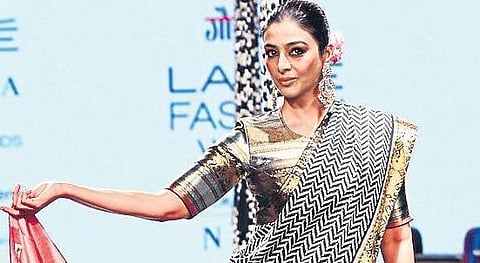

HYDERABAD: Today, March 21, is World Poetry Day, as recognised by the UNESCO. We try to capture how poetry awakens human spirit through its images by talking to city-based poet Iqbal Patni whose poem ‘Aurat’ was commissioned by fashion designer Gaurang Shah and recited by Bollywood actor Tabu on the ramp as part of Lakme Fashion India Week, 2020
Celebrated Irish poet William ButlerYeats wrote: “Had I the heaven’s embroidered cloths… / I would spread the cloths under your feet…” And these lines written in 1899 are for Maud Gonne, whom the poet loved intensely. Here, the mention of clothes so gently mixes with an image perfect for a woman that it instantly gives an impression of a lady walking in her finery with some beautiful lines floating around.
And what happens when a surreal setting like this blends with the real? The result is enchanting. Something similar happened at Lakmé Fashion India Week, 2020; while showcasing fashion designer Gaurang Shah’s collection Garam Masala, Bollywood actor Tabu recited ‘Ainey ne aaj naya chehra dikha diya / merey wajood ko aurat ka naam de diya / husn, haya, ada, wafa aur chaah / in lafzon ko mera zevar bana diya”. Tabu’s recitation was of the poem ‘Aurat -II’ penned by Hyderabadbased poet Iqbal Patni.
Today is World Poetry Day, recognised by the UNESCO, and we try to capture how poetry awakens human spirit on its own and when combined with other art forms. Clad in a black Kanjeevaram ghaghra and Patan dupatta the poem she recited personifies womanhood. On this shares Gaurang, “The theme symbolises womanhood. It is a reflection of every woman’s inner being, her personality, and sensibilities for a distinctive style, appeal.
The idea behind crafting the poem was to also echo the varied, multi-faceted charisma of a woman. The poem was in sync with it. Collaborating with Iqbal was a natural choice, also he is from Hyd e r abad and I have collaborated with him earlier, as he is rooted in our traditions as well as combines well with my thinking of preservation of our ancient traditions.” It was in 2017 that he commissioned Iqbal’s poem ‘Aurat’ for the first time for Lakmé Fashion Week. But blending poetry with ramp walks began much earlier for Iqbal. He shares, “It was in 2005 that I did it for designer Satya Paul at Taj Krishna.
There were also paintings from Apparao Art Gallery. It was a nice blend of poetry, fashion, food and art.” He is in the business of logistics, but then how did he fall in love with poetry? He wrote a poem for the first time in mid 70s while he was still studying at Little Flower School, Chirag Ali Lane. “I was always enchanted with the written word, but it was after I got in touch with the late Urdu poet Roohi Quadri that I began to understand the nuances of this literary form. He’d guide me in placement of words and the flow of the central idea. Gradually my writing shaped up.”
Later, he was invited by Hamstech Institute of Fashion to fuse his verses with the apparel designers created. He’s combined poetry with other art forms as well. He read his poem ‘Badal’ live on stage as the noted Kathak dancer Manjari Chaturvedi danced to the tunes. He developed ‘Tasveer Kii Awaaz’, fusing art and poetry together and showcased it at Daira Art Gallery. He later performed at Tao Art Gallery, Mumbai for the celebrated artist SH Raza followed by another show at Prince of Wales Museum, Mumbai in 2007. His big break came in 2008 when he wrote a song ‘Yaaro Yaaro’ for AR Rahman for the Tamil movie Boys and then for Sivaji: The Boss.
Ask him what’s his next project and pat comes the reply, “To take retirement from my business and indulge full time into writing songs and poems. There’s so much to be done, explored and expressed.” And what does he think of the current literary scene in Hyderabad especially poetry? “We have several talented poets and authors around, who are adding more to the cultural capital of the country which is seeing really tough times. And it’s the powerful words that are the beacons to show the way forward. In these dark times, we need more of poetry to tell the truth through the narratives of people,” he says. — saima@newindianexpress . com